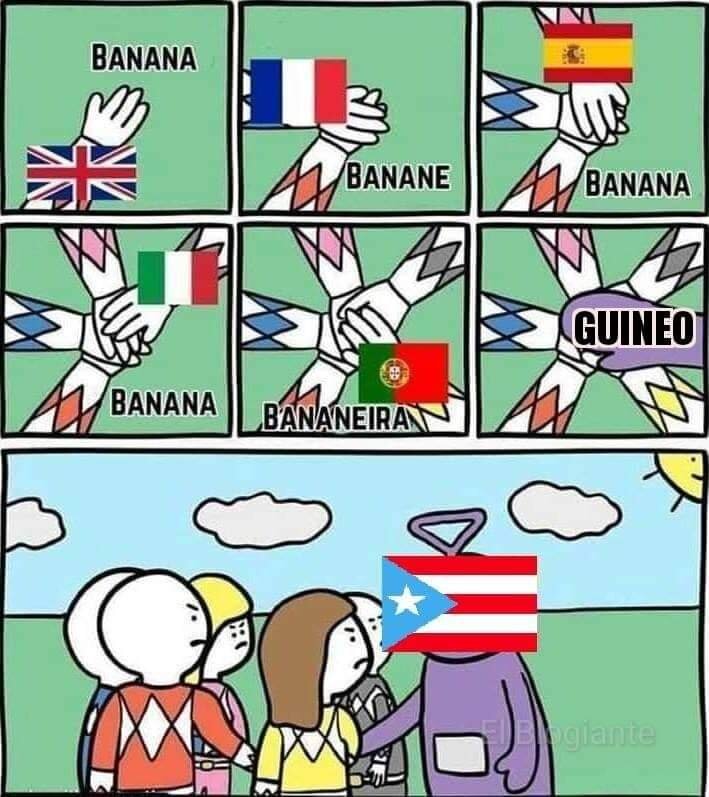
The Words And History That Make Puerto Rican Spanish Unique
Vocabulary to make sure you don’t stick out like a sore pulgar in Puerto Rico.
by Besanya Santiago
Within Latin America, each country has specific words in their dialect that can be completely foreign to other Spanish speakers. Puerto Rico is no different. Since we’ve already discussed the ins and outs of Puerto Rican slang, now lets move on to some common everyday vocabulary.
Puerto Rican Spanish is largely influenced by Andalusia and The Canary Islands in Spain. Many farmers and commoners from these regions came to Puerto Rico in hopes of establishing a better life in the Americas. After some time, Spaniards from other regions arrived as well as European settlers from France, Italy, Ireland, Scotland and Germany. There was even a large number of Arabs and Chinese that migrated to the island. Puerto Rico has an incredibly diverse history. And when you add to this the languages of the African slaves, the language of the Taínos as well as the English imposed by the United States? That’s a pretty intense melting pot of language.
Although this history gives the dialect depth and originality, using certain words from other varieties of Spanish can result in misunderstandings and confusion. For the most part, they are fairly harmless and usually result in having a good laugh. But there are also words to watch out for in order to avoid offending the wrong person. This isn’t usually a concern, though, since Puerto Ricans tend to be incredibly awesome and easy going people (no bias here whatsoever). So, lets get into some of these variations and continue your journey to sounding like a Boricua.
Naranja vs. China
Commonly mistaken for the country, China actually refers to an Orange. The fruit originated thousands of years ago in Southern China, from where it spread throughout India and parts of Southeast Asia. Portuguese sailors eventually brought these sweet delicacies to Portugal and Spain, where they were called China Oranges (naranjas de la China) to distinguish them from the more tart oranges they were accustomed to. In fact, the word naranja comes from the sanskrit word for orange, naranga. Some of us kept naranja and some of us kept china. So no, jugo de china is not juice from China.
Guineo vs. Banana
Since bananas were originally thought to have originated from West Africa, this is where the word guineo comes in. European settlers used to refer to Africa as Guinea. When the Portuguese brought bananas to Latin America, the name came right along with it. Although it is now known that bananas came from Southeast Asia and the South Pacific, the name guineo stuck. Nothing wrong with being an OG.
Guagua vs. Autobus
Although it does sound like a baby crying (it actually is the word for ‘baby’ in Chile), the term guagua is, in fact, a public bus. This word hails specifically from the Canary Islands. It is believed to have come from the name of the US bus company Wa Wa and Co. that provided public transportation throughout the islands. The pronunciation can vary (wawa vs guagua) but what doesn’t vary are the crazed looks I get in other countries when I use this instead of autobus.
Zafacón vs. Basurero
Zafacón is a trash can in both Puerto Rico and Dominican Republic. After the end of the Islamic Era in the Iberian Peninsula, many Arabs joined the Spaniards in their journey to conquer new territories. A zafaca, which is a clay container in Arabic, is what they used to collect the waste that fed pigs. The word later developed into zafacón. As it happens, Arabic is the second-largest language that influenced Spanish, after Latin.
Insectos vs. Bichos
If you don’t remember any of these terms, try to remember this: Do NOT use the term bichos in Puerto Rico. It is the only country in Latin America in which it does not mean insect. It’s very vulgar. Simply use insectos and you’ll be fine. As a Puerto Rican, the most insane thing I constantly hear is: Éste bicho no me quiere dejar quieta (this “insect” won’t leave me alone). I’ll leave it to your Google search to find out why.
Lechosa vs. Papaya
Both of these terms can be used to describe the same fruit. However, the word lechosa was initially used to describe an unripened papaya. In Puerto Rico, there is a popular dessert called dulce de lechosa (candied papaya). To make it, you need to use an unripened papaya. When this type of papaya is cut open, it releases a thick juice that’s milky in quality. Lechosa literally means milky, which is how the fruit got its name.
Sorbeto vs. Pajita
A drinking straw can be translated into tons of different ways in Latin America. From pitillo and popote (Colombia and México) to absorbente and bombilla (Cuba and Chile), things can get confusing very quickly. Here’s the Puerto Rico version: Sorbeto comes from the Spanish word sorber, which means ‘to sip’. That’s it. Yea…we prefer to keep things nice and easy. #islandlife
Bizcocho vs. Pastel
This word for ‘cake’ also came along with the Spaniards. Originating from the Latin word bis-coctus, it describes a type of bread cooked twice to prevent it from spoiling. FYI: Be mindful when using this word in other Latin American countries. Depending on where you go, it can have an entirely different meaning and may even be offensive. And yes, this is a recurring theme in the Spanish speaking world with many seemingly innocent words.
Embuste vs. Mentira
This is a term used very often but whose origins are relatively unknown. An embuste is a lie and an embustero is a liar. You’ll also hear the word paquetero to describe a person who lies all the time. The speculation is that it came from the Latin word impostorem, meaning impostor, and that it was brought over by the French. Interestingly enough, French immigration to Puerto Rico was one of the largest in number, second only to the Spanish.
Enfogonar vs. Enojar
A verb defined as ‘to anger,’ enfogonar came from the Spanish word enfogar, which literally means ‘kindle’ or ‘ignite’. And if you’ve ever angered a Puerto Rican, you should already understand why this is probably the best word choice to describe what you experienced afterwards.
Other Useful Vocabulary
Chiringa – Kite
Muerto – Speed Bump
Marquesina – Garage
Habichuelas – Beans
Mahones – Jeans
Balompié – Soccer
Carro – Car
Brincar – to jump
Pillo – thief
Jíncho (a) – Pale
Sato – Mixed breed dog
Averiguao (a) – Nosy
Gafas – Sunglasses
Espejuelos – Eye glasses
Aguantar – To hold
Abaníco – Fan
Molestar – to bother
Bruto (a) – dumb
Not so bad, right?
These are just some of the many Puerto Rican words you will come across. And of course, they all vary by region. It may be overwhelming to learn them, particularly if you’re more familiar with a contrasting dialect. But know that once you become accustomed to the sounds of the Puerto Rican accent, the words will make more sense. Words and sounds within a language or dialect always work hand-in-hand to create a complementary cultural harmony. So just sit back, relax and listen to the musical notes of each individual phrase. It’s just a matter of time before you’ll be able to compose your own song and easily dance to the intricate rhythms of the Puerto Rican dialect.
About the Author
Besanya Santiago (IG: @besanyasantiago) is is an actress and writer based in New York City. She is best known for her work on the Netflix series Orange is the New Black. As a multi linguist, she enjoys helping others gain a deeper understanding of language and culture. Originally from Puerto Rico, her aim is to bring an authentic perspective about Caribbean life to people from all over the world. Check out her website, www.besanyasantiago.com.
(Thumbnail Photo by Amy Irizarry from Pixabay)
The Puerto Rican Dialect: An essential guide to sounding like a Boricua
Ready to sound like a native Puerto Rican? Read this guide.
by Besanya Santiago
Ahhh, Puerto Rico. La Isla del Encanto. The quintessential getaway for any person seeking an enchanting paradise to escape from their day-to-day routine. An island where, even when it’s raining, the sun still radiates through the smiles of its local people. The warmth is palpable in the way the island embraces you the moment you set foot onto it. In every woman, you will find your abuela, your mami, your hermana and titi. And as a Spanish learner, this is the perfect place to arrive, listen to the local language and say to yourself: WHAT THE HELL DID SHE JUST SAY?
Yeeeaaa, I know. Latinos usually agree that the Spanish from Puerto Rico is one of the most challenging dialects to understand. Some time ago, I met a woman from Argentina who said to me: “When Puerto Ricans speak Spanish, they sound like they’re rapping a Reggaeton song during the entire conversation.” She’s not wrong. We speak insanely fast and use slang in every other sentence. Additionally, there are certain words that are more or less the same in other countries but drastically different in Puerto Rico.
Ay dios mio…
Puerto Rico was originally named Borikén, a Taíno word translated as “land of the brave people.” The Taínos are an indigenous people who have lived on the island since prior to Spain’s colonization. When Christopher Columbus arrived in 1493, it was renamed to Puerto Rico, meaning “rich port”. This was due to its abundance of natural resources in addition to having generous amounts of gold nuggets in its rivers. Today, Puerto Ricans refer to themselves as Boricuas in order to illustrate recognition of their Taíno heritage. The dialect is a mix of the Taíno, Spanish and English language with African pronunciations, making it truly distinctive. Locals will be tremendously impressed if you manage to include some Puerto Rican slang into your Spanish. Lets explore this dialect further and get you sounding like a true Boricua.
Nuestro acento
It’s important to mention that accents always vary by region. These language tendencies will not apply to everyone. Some may not use any of them. However, these are the most recognizable characteristics of the Puerto Rican dialect. I just wanted to make that clear to avoid getting bulldozed by a fellow compatriot: “OYE PERO YO NO HABLO ASI!!!!! “
Love you, mi gente. Vamos allá.
The letter “R”
We’re constantly made fun of for this one. We roll our R’s only sometimes. More often than not, the R is pronounced as an L. Puerta is Puelta. Porque is Polque. Verde is Velde. However, this is not the case if the R is at the beginning of a word. Puerto Rico would be pronounced Puelto Rico. In certain regions, the R is never rolled. Instead the guttural R is used, which sounds identical to the R in French.
The letter “D”
Almost non-existent in word endings. We don’t say cerrado. We say cerrao. Pegado is pegao. However, if there is another D in the same word, it is still pronounced. Confundido would be confundio.
The letter “S”
Frankly, I don’t even know why we include this one in our alphabet. Again, almost non-existent and sounds like an H. Cómo estás turns into cómo ehtah. Pescar is Pehcal (don’t forget to make that R an L!) and mezclar is mehclal. The letter Z functions exactly like the S.
Word endings
These tend to be chopped off. The word para is actually pa. Therefore, para nada becomes pa’ na’ and para que becomes pa’ que. It also occurs in feminine words that would ordinarily drop the letter D. For instance, cerrado becomes cerrao but when speaking about a feminine object, it then becomes cerra. So now you can say: La puelta ehta cerra.
Nuestro Dialecto
Slang words are used quite often in Puerto Rico. Try to incorporate some of these fun expressions into your everyday Spanish to truly immerse yourself in the dialect.
“Ay Bendito!”
You cannot leave Puerto Rico without hearing this one. It’s used to express pity, shock, anger and sometimes even sarcasm. Similar to the expression “oh my gosh.”
Example: Ay bendito, pero que te pasó? / Oh my goodness, what happened to you?
“Janguear”
One of the most well-known examples of Spanglish meaning “to hang out.”
Example: Vamos a janguear esta noche? / Are we hanging out tonight?
“Wepa”
This is as Boricua as it gets. You don’t say it. You yell it. It demonstrates pride and joy, particularly in situations where people are feeling patriotic. Which for us is ALL. THE. TIME.
Example: Ricky renunció!!! Weeeeeeeeepaaaaaaaaa!!!!!! / Ricky (Rosselló) quit! YAAAASSSSSS!!!!
“Revolú”
Used to describe loud commotions and disorder. An absolute racket.
Example: Oístes el revolú que hubo anoche? / Did you hear that racket last night?
“Brutal”
A compliment used to describe something that is beyond incredible. It has the same strength as the word “brutal” in English but for something good. And there’s a lot of intensity behind it when spoken.
Example: Nena, el pelo te quedó brutal! / Girl, your hair turned out incredible!
“Pichear”
To forget or ignore something in the maximum way possible. “Ghosting” is probably the most accurate description.
Example: Antes tu me pichabas, ahora yo picheo…. #badbunnyforever / Before you ignored me, now I ignore you…
“Al garete”
Something that is disorganized, out of control or a complete mess. In a more literal sense, it means “without a given path.”
Example: No pongas las manzanas así al garete. / Don’t place the apples like that, all disorganized.
“Bochiche”
Gossip. A person who gossips constantly is called a Bochinchero(a).
Example: Esa madre tuya es una bochinchera. / Your mother is such a gossip.
“Fó”
There is no translation for this. It’s what you say when you smell something awful or see someone doing something gross. Usually preceded by an ay.
Example: Ay, fó! Limpiáte esos pies que apestan! / Ew! Clean your feet, they stink!
“Corillo”
A large group of people or friends. Simply put: your people.
Example: Dile al corillo que vamos pa’ la playa! / Tell the crew we’re going to the beach!
“Pana”
A very close friend. Someone who is a partner-in-crime and you trust completely. Not to be confused with the delicious breadfruit in Puerto Rico also called Pana (even though I would trust that Pana with my life, too.)
Example: Manuel, mi pana, como estamos? / Manuel, my friend, how we doing?
“Perreo / Perrear”
The Boricua way to dance and party. And party hard. And usually to Reggaeton music.
Example: Prepárate que esta noche nos vamos de perreo! / Get ready, tonight we’re gonna party it up!
Now it’s your turn!
Try them out! And don’t worry if you can’t make it all the way to Puerto Rico. We are everywhere and are especially known for being warm, social beings. So, grab your corillo and head to the nearest discoteca for a long night of perreo. Order some piña coladas and engage is some real life Puerto Rican bochinche. By the end of the night, you’re sure to be officially recognized as a Boricua de corazón. WEPA!
About the Author
Besanya Santiago Ayala (IG: @besanyasantiago) is an actress, world traveler and writer based in New York City. She is best known for her work on the Netflix series Orange is the New Black. As a multilinguist, she enjoys helping others achieve an extensive understanding of language and culture. Originally from Puerto Rico, her aim is to bring an authentic perspective about Caribbean life to people from all over the world. Check out her website, www.besanyasantiago.com.
Thumbnail photo by Ernesto Tapia on Unsplash.





